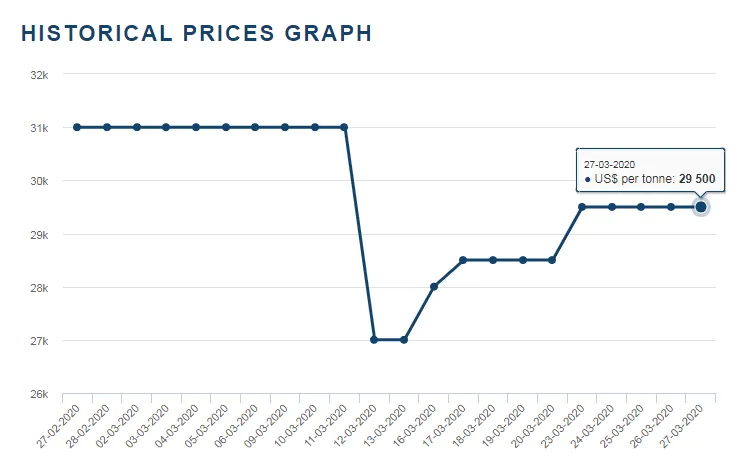Mining and metals industries have been hit hard by the global slowdown. However, despite everything the market faces in the immediate short term, the long-term outlook remains bullish.
For example, cobalt was not immune to the ‘dash for cash’ when wider equity, cryptoasset and other markets experienced heavy selloffs in the second week of March (see table below). But as you can see, demand for the speciality metal has remained steady and has been increasing since that relative low point.

A contributing factor here is likely cobalt’s key position in the manufacture and development of rechargeable electric vehicle (EV) batteries. Irrespective of the outbreak of coronavirus, this is a sector that is set to grow enormously over the coming years.
#A changing landscape
Once the historic disruption of the coronavirus pandemic starts to fall away, and industries, factories and mines begin to restart operations, the combination of immense stimulus packages from Western and Asian central banks and a relaxation of the restrictions on the public and businesses at large could serve to drive battery metal production to near all-time highs, in our estimation.
How long that will take in the short term is anyone’s guess. It could be as little as six months or as long as two years. Industry participants are on pause at the moment. But the most resilient among them are continuing to watch markets closely while preserving operational cash flow for the inevitable restart.
Against this backdrop, Mitchell Smith, president and of Global Energy Metals (TSX.V:GEMC), believes the global disruption caused by Covid-19 could fundamentally change the way investors get exposure to battery metals.
Smith sees the major battery metal supply issues created by Covid-19’s impact on China in particular as the first jolt in the de-globalisation of the battery mineral supply chain. As firms re-assess their over-reliance on the country, he believes that domestic metal supply and refinement will be increasingly sought out.
“Prior to the pandemic, there had long been great debate surrounding the world’s dependence on China for the refining of critical minerals like cobalt paramount to vehicle electrification and low-energy storage,” he says. “However, in spite of years of trade-wars, talks of rebuilding domestic supply chains, and revival by U.S. European manufacturing, the country remains dominant.
“We see supply readjustments materializing from the pandemic. It really puts into question the reliance on one country’s dominance in the control of the majority of material supply forcing the aforementioned manufacturing hubs to take notice. As the world rebuilds and economies are stimulated with state funding, now is the time for governments to take notice and re-evaluate how they can be competitive in the transition to a low energy economy.”
To this end, Global Energy is developing a portfolio of battery minerals projects located in top-tier, safe, pro-mining jurisdictions. The company holds 100% of the Millennium Cobalt Project and two neighbouring discovery stage exploration-stage cobalt assets in Mount Isa, Australia, positioning it as a leading explorer and developer of the metal in Queensland. Also in its portfolio are the Nevada-based Lovelock cobalt mine and Treasure Box project, which neighbour Tesla’s Gigafactory One – the world’s largest lithium-ion battery production plant.
